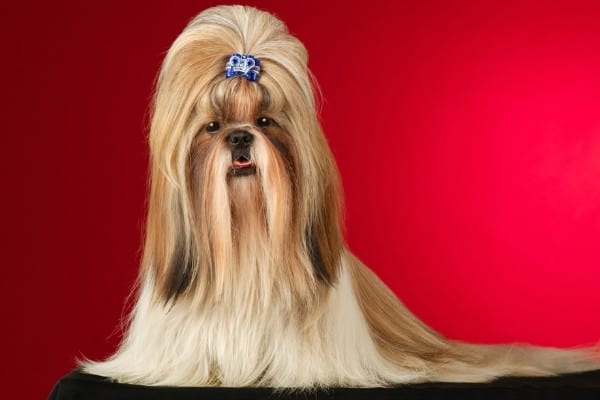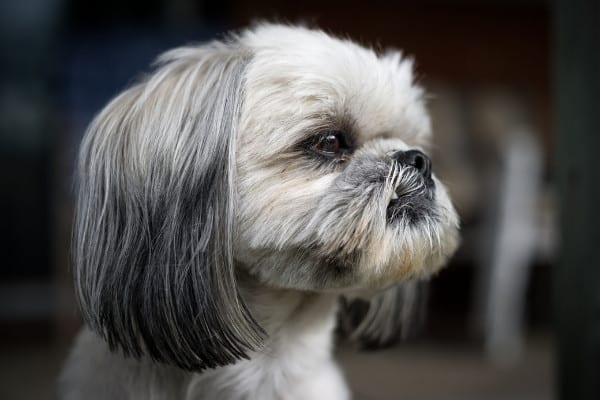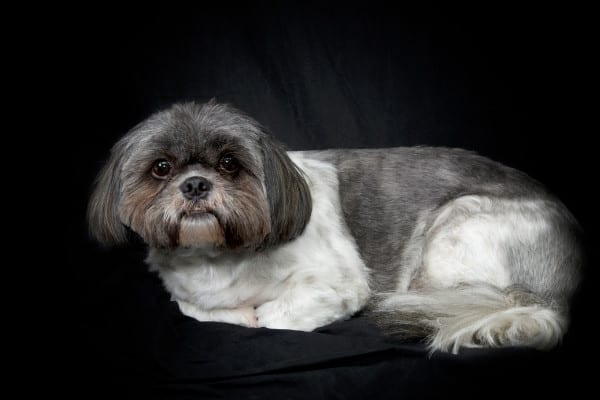
There’s a lot to love about Shih Tzus, and their crooked little smiles seem to draw everyone in.
While most people associate Shih Tzus with not-so-perfect teeth, it’s a good idea to understand why so many Shih Tzus have underbites and how it affects their health.
Do Shih Tzus have underbites? Many Shih Tzus do have underbites to some extent. Underbites occur when the lower jaw teeth extend forward more than the upper jaw teeth. The AKC includes an underbite as part of the Shih Tzu breed standard and does not consider misaligned teeth a fault.
If you are thinking about bringing a Shih Tzu into your home or already have one and are curious about their underbite, you’ve come to the right place.
In the following, you’ll learn more about why this issue is so common for the breed and whether or not it is something to worry about.
Underbites in Shih Tzus
Shih Tzus are known for their big eyes, short snouts, and adorably awkward underbites. This condition is more common in this breed and other small, purebred dogs than others.
Here’s what you should know if your Shih Tzu has an underbite.
What Is an Underbite?
An underbite is a form of malocclusion and is very common in dogs with short muzzles.
Shih Tzus with an underbite have bottom teeth that extend forward more than the top teeth do. Underbites are often genetic, but not all Shih Tzus have them.
Is an Underbite Normal for a Shih Tzu?
Shih Tzus and other small breed dogs often have underbites. It is very common for the breed, and it’s a characteristic that many Shih Tzus owners love.
Some breeders actually breed with the intention of producing puppies that have underbites.
Do All Shih Tzus Have Underbites?
Not all Shih Tzus have underbites, but many do. In fact, an undershot or underbite is part of the breed standard.
Underbite According to Shih Tzu Breed Standards
The AKC recognizes an underbite as part of the breed standard for Shih Tzus. The standard also described the jaw as wide and broad.
If the dog has missing teeth or teeth that are misaligned, there is no fault. An overbite, however, is considered to be a fault in the showring.
Note that while an underbite is standard for the breed, neither the teeth nor tongue should be visible when the mouth is fully closed.
Are Shih Tzus Born With an Underbite?
Shih Tzus can be born with an underbite, or it may develop as they get older.
Some puppies may have underbites until their adult teeth come in. Others may only develop an underbite once their larger adult teeth push out the smaller baby teeth.
Some Shih Tzus are born with the underbite and have it throughout their lifetime.
Why Do Shih Tzus Have an Underbite?
In Shih Tzus, the underbite is most commonly due to the compression of the muzzle, a. trait that was purposely bred into Shih Tzus and other brachycephalic breeds.
Shih Tzus who are not born with an underbite can develop one if they are injured, loose teeth, or if their adult teeth are too large for their jaw or come in misaligned.
Are Shih Tzu Underbites Genetic?
Shih Tzu underbites are often genetic but not always.
While the most common cause of an underbite is a (purposeful) deformation of the skull or a malformation of the teeth, there are other things that can cause an underbite as well.
Some other common causes include infections, trauma, and injuries that did not heal correctly.
Potential Issues Cause by Shih Tzu Underbite
While an underbite may not always cause problems for a Shih Tzu, there are some potential issues that may arise.
Here are some examples of possible complications that can occur as a result of an overbite.
Periodontal Disease
An underbite can make it difficult to clean your dog’s teeth properly, which can lead to canine periodontal disease.
Canine periodontal disease occurs when calculus builds up severely on the teeth and causes the gums and teeth to separate. It can lead to pain, tooth decay, and tooth loss.
Good dental hygiene is incredibly important for the prevention of tooth and gum issues.
Be sure to brush your dog’s teeth several times per week with a brush and toothpaste made specifically for dogs, like this kit that I use with my own dogs.
- Nylabone Advanced Oral Care provides easy oral care, leaving your pet with fresh breath and healthy...
- Features an angled neck for better reach and nylon bristles to clean between teeth
Pain
An underbite can be painful for some Shih Thus. It can cause the teeth to touch or poke into the gums. It may also cause nerve pain and pain from tooth decay.
Trouble Chewing
Many Shih Tzus suffer from eating problems as a result of severe underbites. When the teeth do not line up correctly, the dog may not be able to tear, bite, or chew his food properly.
Bad Breath
The position of the teeth can make it difficult for owners to clean their dog’s teeth and result in bad breath. Bacteria and plaque can grow on the teeth and create bad odors.
Infections
The underbite makes it harder for the dog’s teeth to be cleaned, which means bacteria can grow more easily. This can lead to tooth decay, which can lead to tooth and gum infections.
Bone Loss
The underbite can make it easier for infections and diseases to affect the gums and jawbones. As the infection becomes worse, bones in the jaw can deteriorate, leading to pain and trouble eating.

Will a Shih Tzu Mix Have an Underbite?
Whether or not your Shih Tzu mix has an underbite depends on the specific genetics of each parent and the way the genes were inherited in your dog.
Underbites are common in purebred Shih Tzus, but not every Shih Tzu mix will have one.
How Do You Fix an Underbite on a Shih Tzu?
Treatment plans for Shih Tzus with underbites can vary depending on the cause and the severity.
Underbites can be corrected by removing some of the dog’s teeth, moving the teeth into a different position, or by shortening them.
Most canine orthodontists will not attempt to fix a Shih Tzu’s underbite unless it is causing problems.
Tooth Extraction
Due to the small size of Shih Tzus, their mouths are sometimes not capable of accommodating all of their adult teeth.
If the underbite is caused by some teeth pushing the others forward, those teeth may be removed so the other teeth can be aligned properly.
Crown Modification
The crowns of the teeth can be shortened or modified to prevent the teeth from touching or grinding and causing pain or other problems.
Movement Up Adult Teeth
The adult teeth can be moved to arrange them in a position that provides a better bite. Some Shih Tzu’s are given braces to move the teeth over time to gradually provide straighter teeth.
Interceptive Orthodontics
If the Shih Tzu still has baby teeth, they are removed in a procedure called interceptive orthodontics.
The removal of the baby teeth allows the adult teeth to grow properly so there are no complications or problems.
How Much Does It Cost To Fix a Dog’s Underbite?
Fixing a dog’s underbite can cost anywhere between $500 and $5,000.
The severity of the underbite, the underlying cause, and the number of procedures it takes to fix the problems are all factors in the total cost.
Other Shih Tzu Jaw Problems
Shih Tzus are prone to many different types of jaw problems, and many of them are genetic.
Some other jaw problems they suffer from include missing baby teeth, malformed teeth, cleft palates, and overbite.
Genetics are the main cause of these issues, but infections and injuries can also cause jaw and dental issues.
Why Does My Shih Tzu Have Crooked Teeth?
Your Shih Tzu’s bad teeth could be due to an underbite, overbite, tooth malformation, missing teeth, overcrowding, or skull deformities.
A veterinarian or veterinary dentist can diagnose any dental or jaw problems that could be causing the teeth to be crooked.

What Other Dog Breeds Have an Underbite?
Many dog breeds have underbites, but the condition affects small breeds the most often. Some examples include,
- Cavalier King Charles Spaniel
- Pug
- Boston Terrier
- Chihuahua
- Boxer
- Maltese
- Lhasa Apso
- Yorkshire Terrier
- Pekingese
- French Bulldog
- English Bulldog
- Pomeranian
Can a Shih Tzu Have an Overbite?
Shih Tzu’s can have an overbite, but underbites are much more common in the breed.
An overbite is often the result of genetics but can also be caused by dental problems, injuries and infections. Overbites are typically treated the same as underbites.
Final Thoughts
Shih Tzu’s often have quirky underbites to match their adorable personalities. While some underbites can cause health problems, many are simply cosmetic issues.
If you have a Shih Tzu or are thinking about getting one, make sure you understand what an underbite might mean for your dog so you can provide proper care.
Last update on 2024-04-18 at 19:01 / Affiliate links / Images from Amazon Product Advertising API





